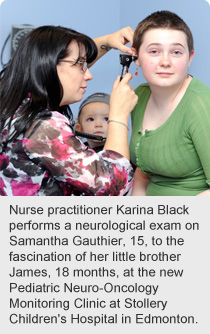
October 17, 2012
Story by Greg Kennedy
EDMONTON — Fifteen-year-old Samantha Gauthier loves to read and write fiction — but for almost two years, worsening headaches made it harder for the academically oriented teen to concentrate.
As well, balance issues and blurry vision were proving a real-life mystery and serious health concern.
The mystery was solved in August when an MRI of her brain revealed a golf ball-sized tumour, which has since been surgically removed.
Now receiving radiation therapy, Samantha is among children and teens with brain tumours now benefiting from highly co-ordinated specialized care thanks to a new Alberta Health Services (AHS) clinic that simplifies their family’s journey through neurosurgery, radiation therapy, chemotherapy and follow-up.
“Everybody’s really friendly and they all know me by name and stuff, so it’s not like coming to a hospital. They’re like a friendly, caring family to me,” she says.
“They co-ordinate all my appointments,” adds the Grade 11 student, who lives near Vilna, 170 km northeast of Edmonton. “When I have my radiation, they try to schedule all my doctors for the same time of day because we have a two-and-a-half-hour drive into the city.”
With its one-stop approach, the Pediatric Neuro-Oncology Monitoring Clinic at Stollery Children’s Hospital ensures consistency of care — as well as familiar, friendly faces who get to know the family well — as it keeps a watchful eye on their child’s health both during treatment and for months and years afterwards with ongoing check-ups.
Pediatric nurse practitioner Karina Black and her colleague, nurse co-ordinator Clare McDonald, provide symptom management, educational support and co-ordinated care involving the entire spectrum of specialists in neurosurgery, radiation and chemotherapy as well as endocrinology, neuropsychology and social work. In short, this two-nurse clinic has become a welcoming, knowledgeable home base for families as it helps them to navigate what used to be a more time-consuming, complicated care pathway.
“Before, there was never a consistent place to bring these kids who are not being admitted to hospital but who are on outpatient therapies, and who need some ongoing surveillance to monitor them,” says Black, who oversees the new clinic.
“With our Tuesday afternoon clinic each week, we have consistency in both the timing and the people seeing our families.
“When we see a child weekly, we notice things earlier. We know the child. We know the questions to ask. We know if they’re having some swelling with radiation therapy and starting to have some double vision. A five-year-old isn’t good at describing that.”
The clinic, established last year at the Stollery, has helped 36 children to date and sees four to six different patients, over a total of 10 to 16 patient visits, each month.
“I think the clinic’s awesome, actually,” says Samantha’s mother, Lynette Gauthier. “Everyone gets to check up on Samantha and see how she’s doing, without us having to traipse into many doctors’ offices. It’s really good to deal with the same people all the time because then they’re familiar with Samantha and you’re not going over the same information again and again. It puts her mind at ease, too, as she builds a rapport with everybody.”
McDonald says the clinic is one way AHS is simplifying the health system for Albertans.
“Navigating through the health system can be pretty complicated for people. Having one place to come, to learn and find the information you need, is huge,” she says. “It’s really hard to be a mom and a dad and be a nurse and a doctor, too. We give parents information to empower them.”
“Through this clinic,” adds Dr. Bev Wilson, Clinical Director of the Northern Alberta Children’s Cancer Program, “the program hopes to support pediatric brain tumour patients and their families throughout their journey, from diagnosis and beyond.”
The Pediatric Neuro-Oncology Monitoring Clinic also reflects the growing role of nurse practitioners at AHS. They are highly qualified nurse specialists who are able to diagnose, order tests, prescribe treatment and medication as they manage independent clinics and carry their own patient caseload.
Samantha offers a word of encouragement to other children and teens who come to the clinic.
“You don’t have to be worried because everything is going to be OK,” she says. “Everybody there takes really great care of you.”